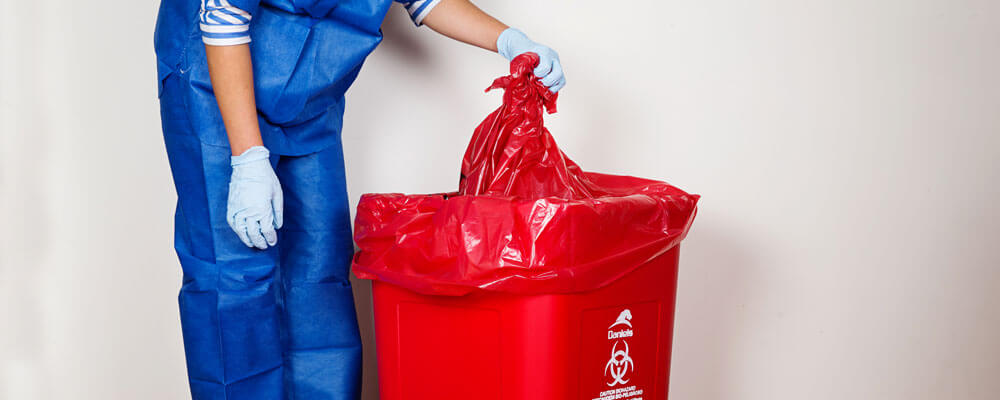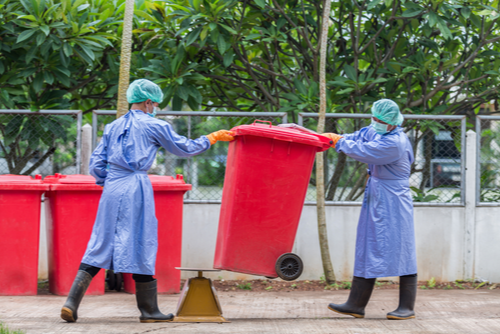Medical Waste Removal Proficiency: Where Service Quality Fulfills Wellness Standards
Medical Waste Removal Proficiency: Where Service Quality Fulfills Wellness Standards
Blog Article
Remain Ahead of Rules: Specialist Guidance on Medical Waste Disposal
In a globe where the medical care industry is constantly developing, it is essential for medical facilities to stay ahead of laws when it comes to the proper disposal of clinical waste. With rigorous standards and constant regulatory changes, it can be challenging to navigate the complexities of this process. With skilled recommendations, centers can make sure compliance and alleviate dangers connected with improper waste disposal. From understanding the different groups of clinical waste to carrying out the ideal collection and segregation methods, this discussion will certainly give beneficial understandings and actionable tips to help centers stay ahead of laws in the ever-changing landscape of clinical waste disposal.
Recognizing Medical Waste Categories
Recognizing medical waste groups is crucial for appropriate disposal and monitoring in healthcare centers. Clinical waste refers to any waste generated by medical care tasks that may posture a hazard to public health or the setting. It is essential to classify clinical waste accurately to guarantee its secure handling, transport, disposal, and treatment.
There are a number of groups of medical waste that healthcare facilities require to be acquainted with. The most common classifications consist of transmittable waste, pathological waste, sharps waste, pharmaceutical waste, and chemical waste. Each category has particular standards and laws for its proper administration and disposal.
Contagious waste consists of products infected with blood or various other bodily fluids, such as gloves, gowns, and lab societies. Pathological waste refers to human tissues, organs, or body parts that need special delivery and disposal. Sharps waste consists of made use of needles, syringes, and various other sharp objects that can cause injury and transmit infections. Pharmaceutical waste comprises expired, unused, or contaminated drugs that need careful handling and disposal. Finally, chemical waste includes solvents, disinfectants, and other chemical substances used in healthcare facilities.
Remaining Up-To-Date With Regulatory Modifications
Staying existing with regulative adjustments is essential for health care centers to make certain compliance and proper administration of clinical garbage disposal. medical waste removal near me. With laws frequently advancing, it is crucial for healthcare centers to remain updated to avoid fines, penalties, and prospective harm to the setting and public health and wellness
To stay in advance of regulatory adjustments, health care facilities need to establish a system for surveillance and monitoring updates. This can be done by subscribing to governing newsletters, attending seminars and workshops, and proactively taking part in sector associations. Additionally, centers should mark a team member or team liable for staying educated and disseminating details to relevant stakeholders.
Routine interaction with regulative firms is additionally vital. Medical care facilities must develop relationships with neighborhood, state, and federal companies to ensure they understand any kind of changes in regulations that might influence their waste management methods. This can be done via regular conferences, engagement in public remark periods, and positive involvement with regulative agencies.
Furthermore, medical care facilities need to consider partnering with waste management business that concentrate on clinical garbage disposal (medical waste disposal services with WasteX). These business are usually well-versed in the most up to date laws and can provide assistance and assistance to make sure compliance
Applying Correct Collection and Partition Methods
To efficiently handle clinical garbage disposal, health care centers should develop appropriate collection and partition techniques based on regulative guidelines. Executing these techniques guarantees the risk-free handling and disposal of potentially dangerous materials, secures the setting, and decreases the danger of injuries pop over to this web-site and infections to health care workers and the public.
Correct collection and partition techniques include the use of designated containers and classifying systems. Health care facilities ought to supply clearly labeled containers for different sorts of clinical waste, such as sharps, transmittable waste, pharmaceutical waste, and non-hazardous waste. These containers need to be color-coded and plainly marked to avoid complication and advertise simple identification.
In addition, health care facilities must train their team on the proper procedures for collecting and setting apart medical waste. This includes enlightening them on the different kinds of waste, the appropriate containers to utilize, and the value of complying with policies and standards. Routine training sessions and correspondence course should be performed to guarantee that team members stay up-to-date on ideal methods.
Furthermore, health care facilities must develop a system for regular collection and disposal of clinical waste. This might include partnering with qualified waste administration firms that concentrate on medical garbage disposal. These companies will make certain that the collected waste is carried and gotten rid of in conformity with regulatory demands.
Picking the Right Disposal Methods

Incineration is one of the most common and reliable techniques for disposing of specific sorts of clinical waste, such as pathological waste and sharps. It entails the regulated burning of waste at high temperatures, decreasing it to ash. Incineration can release harmful pollutants into the air and contribute to air contamination.

Other disposal techniques consist of chemical therapy, microwave treatment, and landfilling. Chemical therapy includes using chemicals to disinfect and counteract the waste. Microwave therapy uses microwave power to warm and disinfect the waste. Landfilling includes burying the waste in an assigned landfill area (medical waste disposal services with WasteX). Nevertheless, landfilling needs to be the last resource due to the prospective threat of contamination to dirt and groundwater.
Making Sure Conformity With Paperwork and Training
After meticulously taking into consideration the appropriate disposal approaches for clinical waste, medical care centers have to make certain conformity with laws and lessen ecological effect by carrying out efficient paperwork and training procedures. This step is important in maintaining a safe and lasting atmosphere for both health care workers and the public.

Training is just as important in Resources making sure conformity with regulations. Health care employees that handle medical waste must obtain appropriate training on waste segregation, taking care of, and disposal treatments. This training should cover topics such as the appropriate usage of individual protective devices, recognition of various kinds of waste, and the proper disposal approaches for each waste group. By offering detailed training, medical care centers can encourage their team to make enlightened choices and minimize Related Site the risk of improper waste disposal.
Conclusion
To conclude, staying ahead of regulations in clinical garbage disposal is crucial for healthcare centers. medical waste removal service. Understanding the different groups of clinical waste, staying updated with governing modifications, executing proper collection and partition approaches, selecting the appropriate disposal approaches, and making certain compliance through documents and training are all necessary steps. By adhering to these standards, healthcare companies can efficiently dispose and take care of of medical waste in a secure and accountable manner
From recognizing the different groups of medical waste to applying the ideal collection and partition techniques, this conversation will give actionable pointers and important understandings to help facilities remain ahead of guidelines in the ever-changing landscape of medical waste disposal. - medical waste disposal services with WasteX
The most common classifications consist of transmittable waste, pathological waste, sharps waste, pharmaceutical waste, and chemical waste. Medical care centers should offer clearly identified containers for different types of clinical waste, such as sharps, contagious waste, pharmaceutical waste, and non-hazardous waste. Health care centers must develop a detailed system to videotape and track all facets of clinical waste disposal, consisting of kinds of waste created, amounts, and disposal approaches made use of. Medical care employees that take care of clinical waste needs to obtain ideal training on waste partition, taking care of, and disposal treatments.
Report this page